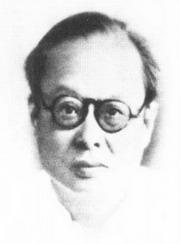Views
Zhōu Shūjiā 周叔迦 (1899-1970)
|
| Notable Associates: |
|
Zhōu Shūjiā 周叔迦 (1899-1970) was an important scholar and teacher of Consciousness-Only 唯識 thought during the Republican period, and a founding member of the PRC's Chinese Buddhist Association 中國佛教協會.
Contents |
Biography
Zhōu's family hailed from Zhìdé County 至德縣, Ānhuī 安徽. In 1920, he graduated from the department of engineering at Tóngjì University 同濟大學 in Shànghǎi 上海 and then helped to open and run a factory.
After moving to Qīngdǎo 青島 in 1926 or 1927, Zhōu encountered a teacher of esoteric Buddhism 密教. After this encounter he became very attracted to Buddhism and began studying Buddhism. By 1929, he had established a Buddhist research society in Qīngdǎo, as well as a center for the distribution of Buddhist scripture. This group, which practiced Pure Land devotions together, eventually became the Qīngdǎo Buddhist Association 青島佛學會.
In 1931, Zhōu moved to Běijīng 北京, where he taught at Běijīng, Tsinghua, and various other universities. He lectured on philosophy and a variety of topics related to Chinese Buddhism, especially its history, Consciousness-Only thought, and Buddhist logic. He also participated in various local Buddhist activities, such as joining the Three Times Study Group 三時學會 established by Hán Qīngjìng 韓清淨 and others. When a Jīn Dynasty 金代 canon was discovered at Guǎngshèng Temple 廣勝寺 in Shānxī 山西 in 1933, Zhōu and others had it reprinted under the auspices of the Study Group. That same year, he published his own Wéishì yánjiù 唯識研究 (Research on Consciousness-Only), which had a preface written by Wáng Xiǎoxú 王小徐.
In 1940, Zhōu helped establish the Chinese Buddhist Seminary 中國佛學院 at Ruìyīng Temple 瑞應寺, for which he served as principal and lecturer. The research association associated with that Seminary published two periodicals, Wondrous Sound 微妙音 and Buddhism Monthly 佛學月刊. Also in 1940, Zhōu and several of his colleagues were inspired by Tánxū 倓虛 to convert the dilapidated Dàbēi Hall 大悲院 in Tiānjīn 天津 into a public monastery for that monk's use. The new renovated monastery opened in 1944.
After the Second Sino-Japanese War, Zhōu became involved in government and remained so after the establishment of the PRC in 1949. He was one of the founders of the Chinese Buddhist Association 中國佛教協會, being elected the Vice-Chief Secretary of the first iteration of that group. He represented the Association in Sri Lanka at a celebration of the Buddha's paranirvana.
In 1956, he represented Chinese Buddhism at a meeting of the Maha Bodhi Society in India and also became Vice-Principal of the newly established Chinese Buddhist Academy 中國佛學院 in Běijīng.
He died of heart and liver failure in Běijīng in 1970.
Important Works
- 法華經安樂行義記
- 法苑談叢
- 灌佛形象經疏
- 決定毘尼經疏
- 牟子叢殘
- 阿彌陀經義疏
- 菩薩戒律彙集
- 唯識研究
- 藥師如來本願經
- 因明學新例
- Many of his writings and lectures were gathered and published by his disciple Sū Jìnrén 蘇晉仁 as Zhōu Shūjiā fóxué lùnzhù jí 周叔迦佛學論著集 (Zhōu Shújiā's Collected Buddhist Writings). Beijing: Zhonghua shuju.
Notable Students
- Sū Jìnrén 蘇晉仁
Notes
References
- Shì Dōngchū 釋東初. Zhōngguó Fójiào jìndài shǐ 中國佛教近代史 (A History of Early Contemporary Chinese Buddhism), in Dōngchū lǎorén quánjí 東初老人全集 (Complete Collection of Old Man Dongchu), vols. 1-2. Taipei: Dongchu, 1974 Pp. 2.717-720.
- Yú Língbō 于凌波, ed. Xiàndài Fójiào rénwù cídiǎn 現代佛教人物辭典 (A Dictionary of Modern Buddhist Persons), 2 vols. Taipei: Foguang, 2004. Pp. 1.552b-554c.
